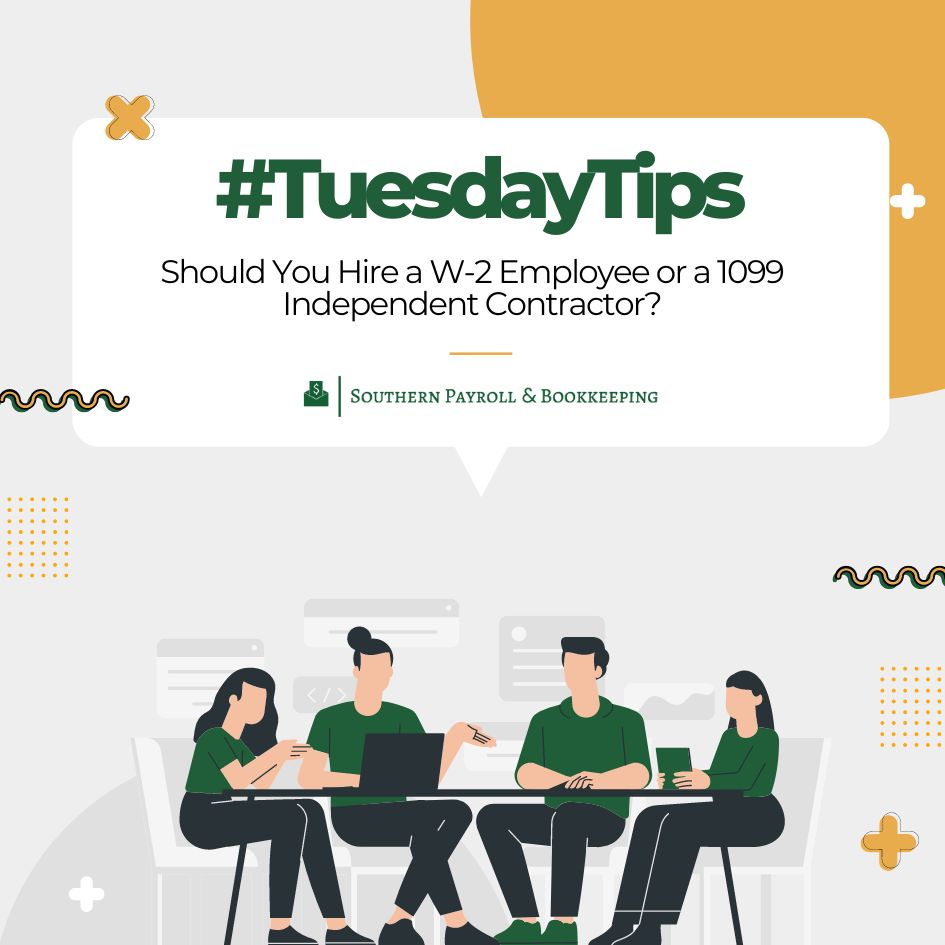It is definitely a big decision to hire a new employee. Starting with a contractor, or a 1099 employee can be a great way to expand your business, but it is very important to take all things into consideration to avoid misclassifying your future employees. In this weeks #TuesdayTip, we will be comparing W-2 and 1099 forms so that you can quickly determine which type of employee you need to hire!

What is a W-2?
The W-2 IRS form is an employee’s Wage and Tax Statement. It is essentially a record of your employee’s compensation, benefits, and taxes that are withheld for the tax year. You fill out a W-2 form for any worker who is part-time or full-time at your business. You are required to fill out a W-2 for each employee that was paid at least $600 for the year. You are also required to fill one out for any employee that you withheld taxes from, even if their gross pay did not meet $600.
What is a 1099?
The 1099-NEC IRS form states how much you paid a worker who is not an employee of your business. These types of workers are mostly independent contractors. This form shows all compensations that you paid the worker within any given tax year– plus all federal, state, and local taxes that were withheld. You are required to file a 1099 for any workers that you paid $600 or more to in the tax year.
So… how do you decide if you should hire a W-2 employee or a 1099 contractor?
The IRS lists three things to be aware of when you are deciding which to hire:
Financial – Does your company control the business aspects of the workers job, like whether they can look for other work in your same market, how they get paid, etc. If you answer yes, you should probably hire a W-2 employee.
Behavioral – Does your company control how and when the worker does the job? When you control things, such as a workers location and schedule, which tools they have and use to complete tasks, and how they complete them, they are more likely to be classified as an employee.
Type of Relationship – Does your company provide benefits, like insurance and paid time off? Is the worker signing onto a job that will last indefinitely? Are the services you are hiring for a key aspect to your business? If yes, it is possible that the worker should be classified as an employee.
It can definitely help to consult a business or labor attorney if you are unsure of the correct way to classify your new-hire.
You might want to hire a contractor when you have a set project in mind, you don’t have guaranteed ongoing work, or the work does not require scheduled hours or a precise location.
You may want to hire an employee when you know that you will have ongoing work for their role, the employee uses your company equipment and follows your company protocols, or the work being done requires oversight and management.
The difference between W-2 employees and 1099 contractors can be tricky to navigate, but here is the bottom line: employees work for the benefit under the rule of your business, while contractors are self-employed and selling you a service. Once you know which kind of worker you are looking to hire, following tax requirements and filling out the right forms is easy.
If you are interested in talking to one of our payroll professionals about which type of workers you should hire, reach out to us here.

